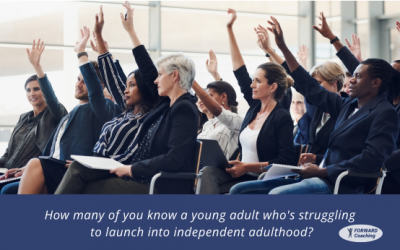Got Questions? Let’s Talk.
Coaching can be a new concept—and you deserve real answers.
Below, I’ve answered the most common questions I hear from clients and families. Grab a coffee and explore. You’re in the right place.

Questions?
Let’s talk through what’s on your mind.
What exactly is life coaching, and how does it work?
A life coach is a professional ally who provides guidance, practical tools, and support to help you gain clarity, take action, and move toward your goals. Unlike therapy, coaching is future-focused and action-oriented. Life coaching is a practical partnership that invites you to set clear goals, experiment with new tools and routines, and build real progress step-by-step—one sustainable change at a time. My role is to invite, support, and challenge you to discover your own wisdom and truth as you create meaningful, lasting change.
How is coaching different from therapy, mentoring, or advice from family?
Coaching is different from therapy, mentoring, or advice from family. Therapy focuses on diagnosing what’s pathological and healing the past, while mentoring is about giving advice. Coaching is about skill-building and practical action steps between sessions, plus exposing limiting beliefs and learning to challenge and change them. A coach doesn’t give advice, but believes you are whole and capable, and helps you find your own solutions and strengths. There’s no diagnosis or judgment—just support, structure, and a clear action plan for growth. All successful people—from athletes to executives—work with coaches, because progress is easier and more effective with a trained ally. Why expect yourself (or your young adult) to do it all alone?
What results can I expect from coaching?
Clients usually experience real change—whether it’s becoming more independent, landing a job, finishing school, or finally developing routines that stick. You’ll leave with new skills, more confidence, and digital tools that help you stay organized and motivated. Many clients say they feel genuinely empowered and able to handle challenges that once felt impossible. The process is hands-on: you’ll set goals, practice new habits, and build progress you can measure and celebrate.
Clients often report:
-
Greater clarity about what they are good about them, what they want (and how to get there)
-
Stronger executive functioning and practical life skills
-
Increased motivation, hope, and self-belief
-
Consistent action on goals that matter
-
Reduced anxiety and “overwhelm,” replaced by steady progress
-
A sense of support, confidence, and new direction
Typical outcomes: “I feel seen, capable, and hopeful again. I finally know how to move forward.”
What does a typical coaching process look like from start to finish?
(I personally do the same thing with my own coach. It makes life so much easier, my growth faster and so much fun.)
Here are the practical steps mapped out:
-
Initial Conversation: We get clear on your goals and what you want to change or create.
-
A Battery of Assessment: We identify current strengths and skills—and where you’d like to grow.
-
Goal-Setting: You’ll pick 1–2 focus goals and we’ll break them into small, manageable steps.
-
Weekly or bi-weekly sessions: 60 minutes each (Zoom/phone), with practical action steps and accountability.
-
Support Between Sessions: You can reach out for quick check-ins or encouragement as needed.
-
Progress Review: We celebrate wins, adjust plans, and keep you moving forward with momentum.
What’s unique about your approach?
-
10+ years of experience working with young adults and midlife clients
- Very loving, non-judgemental and yet direct communication style that helps clients to reconnect with their strength and passion
-
Proven, step-by-step process to build confidence, executive function, and independence
-
Deep commitment to practical progress—no “one size fits all” plans
-
Warm, nonjudgmental, and strengths-based coaching
-
Rooted in research, lived experience, and a genuine belief that small steps create big change
-
Lifelong learner—read a book a week for 25 years and bring global perspective to each client
Do you offer in-person coaching?
A life coach is a professional ally who provides guidance, practical tools, and support to help you gain clarity, take action, and move toward your goals. Unlike therapy, coaching is future-focused and action-oriented. Life coaching is a practical partnership that invites you to set clear goals, experiment with new tools and routines, and build real progress step-by-step—one sustainable change at a time. My role is to invite, support, and challenge you to discover your own wisdom and truth as you create meaningful, lasting change.
What if you don't believe that your young adult would talk with me or want to engage in coaching?
This is a common concerns parents have—and it hasn’t been a barrier. When I speak with young adults and reflect how they’re feeling about life, most say they do want more—they’ve just quietly given up or don’t know where to start. Once they feel seen and understood, most are eager to begin. Even if parents pay for the program, I work directly with the young adult to build trust and forward momentum.
Why do you have a 6-month minimum for 1:1 coaching?
In my experience over the years, the first three months of coaching are all about building trust, helping your young adult take assessments, and gaining clarity on what success and happiness could look like for them. Many clients arrive feeling lost or uncertain, and some make progress from day one. But most begin to excel in the second three months—after their first wins, their confidence grows and they’re ready to stretch further. That’s when the biggest breakthroughs and lasting change tend to happen. I used to offer three-month packages, but often saw clients back away just as momentum was building. With a six-month commitment, those old patterns get replaced by real, lasting progress.
What can I expect from your newsletter?
My newsletter arrives about once a week and is designed to support you with gentle action tips, inspiring case studies, and thought-provoking ideas. I’m an avid reader (a book a week!) and often share practical insights, tools, and recommended resources that can help you move forward. Each issue is short, valuable, and easy to digest—no inbox overwhelm, just a moment of encouragement and a helpful next step.
If you don’t see your question answered here, please reach out—I’m happy to help.
Just email me at anja@forwardlifecoaching.com or schedule a call with me by clicking on this link.
From Our Blog
SUCCESS STREAKS: A New Approach to Help Stalled Young Adults Thrive 🌟
Last week, I had the opportunity to speak at a legal conference on "Stuck in the Nest," addressing the challenges faced by young adults who feel “stuck” in...
The Importance of Playfulness
Just because something needs to get done and is tied to a professional outcome does not mean we can't frame our work in a way that makes it feel light and...
From a Mountain of Shame to a Sledding Hill
Helping Young Adults Break Free from Stuckness, Low Self-Esteem, and Inaction When a young adult seems frozen—unable to move forward with school, work, or...



